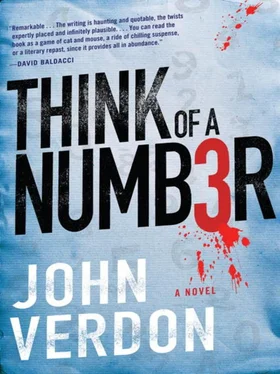In the Sophocles version of the old Greek tale, Oedipus kills a man who turns out to be his father, marries a woman who turns out to be his mother, and sires two daughters with her, creating great misery for all concerned. In Freud’s psychology the Greek tale is a symbol for the developmental phase in the life of a male child during which he desires his father’s absence (disappearance, death) so that he may possess exclusively the affection of his mother. In the case of Peter Possum Piggert, however, there was neither exculpatory ignorance nor any question of symbolism. Knowing exactly what he was doing and to whom, Peter at the age of fifteen murdered his father, entered into a new relationship with his mother, and sired two daughters with her. But it did not stop there. Fifteen years later he murdered his mother in a dispute over a new relationship he had entered into with their daughters, then thirteen and fourteen.
Gurney’s involvement in the case had begun when half of Mrs. Iris Piggert’s body was discovered tangled in the rudder mechanism of a Hudson River day liner docked at a Manhattan pier, and it ended with the arrest of Peter Piggert in a desert compound of “traditionalist” Mormons in Utah, where he had gone to live as the husband of his two daughters.
Despite the depravity of the crimes, steeped in blood and family horror, Piggert remained a controlled and taciturn figure in all interrogations and throughout the criminal proceedings against him, keeping his Mr. Hyde well concealed and looking more like a depressed auto mechanic than a parricidal, incestuous polygamist.
Gurney stared at Piggert on the screen, and Piggert stared back. Ever since he first interrogated him, and even more so now, Gurney felt that the key quality of the man was a need (taken to bizarre lengths) to control his environment. People, even family-in fact, family most of all-were part of that environment, and making them do as he wished was essential. If he had to kill someone to establish his control, so be it. The sex, as big a driving force as it appeared to be, was more about power than lust.
As he searched the stolid face for a hint of the demon, a gust of wind picked up a swirl of dry leaves. They blew with the sound of a feathery broom across the patio; a few clicked lightly against the glass panes of the French doors. The restlessness of the leaves, plus the intermittent thunder, made it hard for him to concentrate. The idea of being alone for a few hours of progress on the portrait, free of raised eyebrows and unpleasant questions, had appealed to him. But now his mind was unsettled. He peered into Piggert’s eyes, heavy and dark-with none of the wild glare that animated the eyes of Charlie Manson, the tabloid prince of sex and slaughter-but again the wind and the leaves distracted him, and then the thunder. Out beyond the line of hills, there was a faint flashing in the murky sky. A couplet from one of Mellery’s threatening poems had been drifting in and out of his mind. Now it came again and stuck there.
What you took you will give
when you get what you gave .
It was at first an impossible riddle. The words were too general; they had too much and too little meaning; yet he could not get them out of his head.
He opened the desk drawer and removed the sequence of messages Mellery had given him. He shut down the computer and pushed the keyboard to the side of the desk so he could arrange the messages in order-beginning with the first note.
Do you believe in Fate? I do, because I thought I’d never see you again-and then one day, there you were. It all came back: how you sound, how you move-most of all, how you think. If someone told you to think of a number, I know what number you’d think of. You don’t believe me? I’ll prove it to you. Think of any number up to a thousand-the first number that comes to your mind. Picture it. Now see how well I know your secrets. Open the little envelope .
Although he’d done so earlier, he examined the outer envelope, inside and out, as well as the notepaper on which the message was written to be sure there was no faint trace anywhere of the number 658-not even a watermark-that could have suggested the number that seemed to come spontaneously to Mellery’s mind. There was no such trace. More definitive tests could be conducted later, but he was satisfied for now that whatever it was that enabled the writer to know that Mellery would choose 658, it wasn’t a subtle imprint in the paper.
The content of the message comprised a number of claims that Gurney enumerated on a lined yellow notepad:
1. I knew you in the past but lost contact with you.
2. I encountered you again, recently.
3. I recall a great deal about you.
4. I can prove I know your secrets by writing down and sealing in the enclosed envelope the next number that will enter your mind.
The tone struck him as creepily playful, and the reference to knowing Mellery’s “secrets” could be read as a threat-reinforced by the request for money in the smaller envelope.
Does it shock you that I knew you would pick 658?
Who knows you that well? If you want the answer ,
you must first repay me the $289.87 it cost me to find you .
Send that exact amount to
P.O. Box 49449, Wycherly, CT 61010 .
Send me CASH or a PERSONAL CHECK .
Make it out to X. Arybdis .
(That was not always my name.)
In addition to the inexplicable number prediction, the smaller note reiterated the claim of close personal knowledge and specified $289.87 as a cost incurred in locating Mellery (although the first half of the message made it sound like a chance encounter) and as a precondition to the writer’s revealing his identity; it offered a choice of paying the amount by check or cash; it gave the name for the check as “X. Arybdis,” offered an explanation of why Mellery would not recognize the name, and provided a Wycherly P.O. box address to send the money to. Gurney jotted all these facts down on his yellow pad, finding it helpful in organizing his thoughts.
Those thoughts centered on four questions: How could the number prediction be explained without hypothesizing some sort of Manchurian Candidate hypnosis or ESP? Did the other specific number in the note, $289.87, have any significance beyond the stated “cost to find you”? Why the cash-or-check option, which sounded like a parody of a direct-marketing ad? And what was it about that name, Arybdis, that kept tickling a dark corner of Gurney’s memory? He wrote these questions down alongside his other notes.
Next he laid out the three poems in the sequence of their envelope postmarks.
How many bright angels
can dance on a pin?
How many hopes drown in
a bottle of gin?
Did the thought ever come
that your glass was a gun
and one day you’d wonder ,
God, what have I done?
What you took you will give
when you get what you gave .
I know what you think ,
when you blink ,
where you’ve been ,
where you’ll be .
You and I have a date ,
Mr. 658 .
I do what I’ve done
not for money or fun
but for debts to be paid ,
amends to be made .
For blood that’s as red
as a painted rose .
So every man knows
he reaps what he sows .
The first thing that struck him was the change in attitude. The toying tone of the two prose messages had become prosecutorial in the first poem, overtly menacing in the second, and vengeful in the third. Putting aside the question of how seriously it should be taken, the message itself was clear: The writer (X. Arybdis?) was saying that he intended to get even with (kill?) Mellery for a drinking-related misdeed in his past. As Gurney wrote the word kill in the notes he was making, his attention jumped back to the initial couplet in the second poem:
Читать дальше












